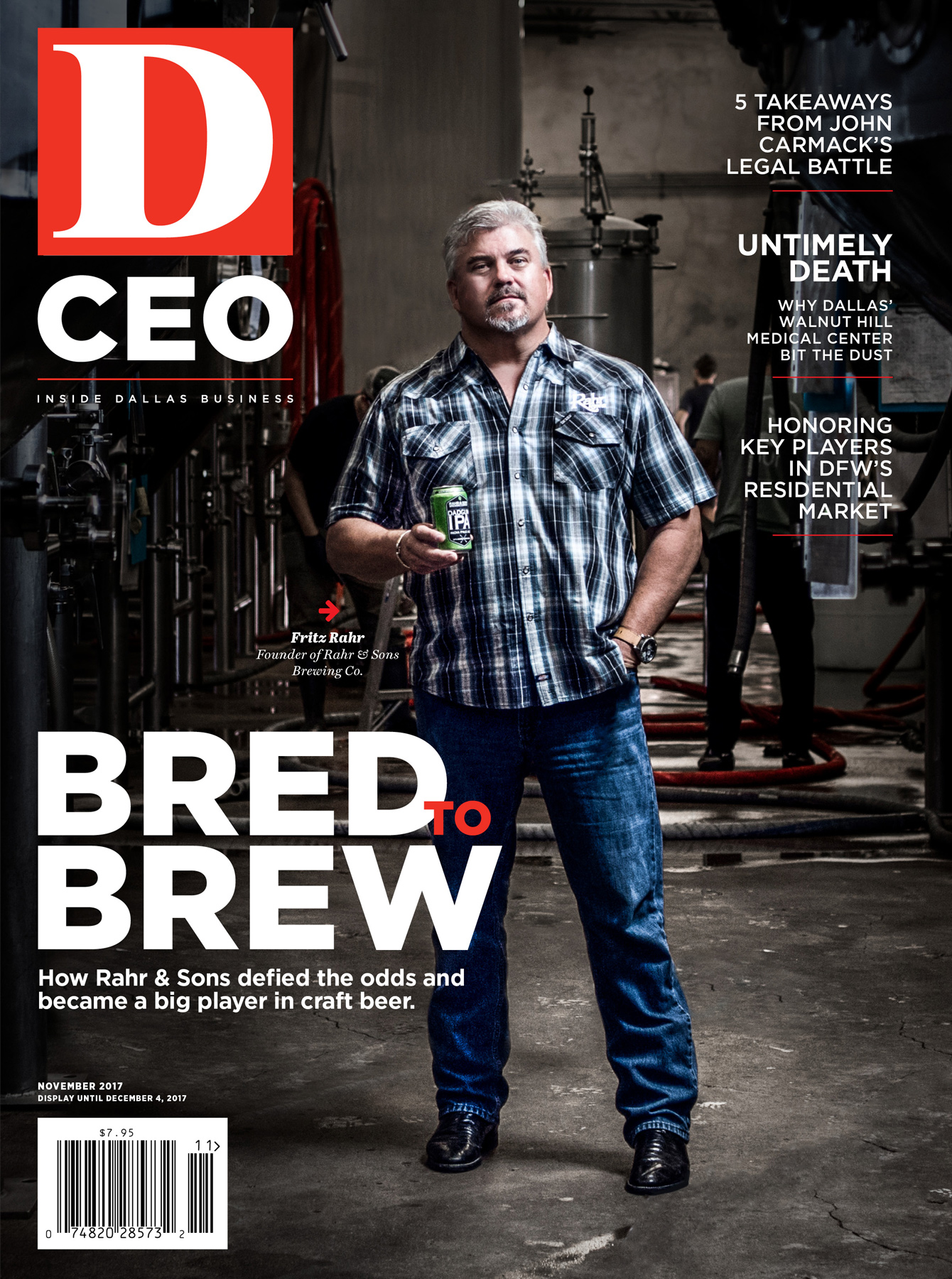In February 2016, a mutual friend introduced Dallas executive George Jones to Ron Baldwin, who runs Kansas City-based CrossFirst Bank. In an introductory phone call, “[Baldwin’s] second or third sentence was, ‘Do you have one more in you?’” says Jones, who retired as CEO of the parent of Texas Capital Bank in December 2013. Jones recalls it took a moment to realize Baldwin was talking about another stint in banking. “‘Yeah. Yeah, I probably do,’” Jones said.
Jones is in his early 70s and financially secure from a decorated banking career. But today he goes on sales and fundraising calls as CrossFirst’s vice chairman out of its Dallas operation, which has grown to 30 employees since launching last October.
His CrossFirst exemplifies why successful corporate leaders try replicating previous achievements long after additional riches change little about their lives, experts say.
Traits like curiosity and determination “drive leaders to success in the first place and often propel them to continue seeking out challenges even once they have reached their initial goals,” says Danielle Cooper, associate professor of management at the University of North Texas. “This is especially true when leaders are driven by intrinsic motivation, or love of the work, rather than just trying to attain external or material goals.” Jones’ CrossFirst gig also answers what separates successful second attempts at business achievements versus those that fail, like in banking, experts say.
To reach the summit again, leaders must understand the factors that got them there before, according to Don Vandewalle, Altshuler distinguished teaching professor at Southern Methodist University’s Cox School of Business. That means building a strong team, he says. “They must also carefully assess the uniqueness of a new leadership situation,” Vandewalle says. His example: Ron Johnson’s disastrous move to head up Plano’s J.C. Penney in 2011.
Jones knows first-hand what it takes to make CrossFirst successful. If he needs inspiration, he can look across Mc-Kinney Avenue to see Texas Capital’s headquarters.
Need to build something
Though he’s got a hill to climb, Jones’ job is arguably easier now than it was at Texas Capital. CrossFirst has more than $2.5 billion in assets and is celebrating its 10th year in business. “We had nothing—no assets, no deposits,” Jones says of his Texas Capital days. “Now we have employees, systems, and processes, so I can focus on raising money and landing business.”
As a founding executive at Texas Capital, Jones helped raise money for a predecessor institution, then ran banking operations during its first 10 years. Jones took the helm of the mothership in spring 2008, when Joseph “Jody” Grant retired as CEO of the publicly traded company. The underlying bank’s assets grew from about $4.65 billion in mid-’08 to $11.7 billion when Jones retired in late 2013.
A non-compete solicitation agreement with Texas Capital limited Jones’ business ventures two years into his retirement. “I didn’t have the passion I was looking for,” he says. “In the business I knew, building something from scratch was exciting.”
Of the three motivations many psychologists believe combine in various forms to drive human behavior, the desire for achievement is the most common impetus for leaders’ actions, according to Dianna McFarland, associate professor of professional practice at Texas Christian University. She notes power and working in groups also drive leaders.
But what separates the motivations of successful leaders from those of everybody else? Aside from ambition, another common factor is a desire for “lifelong learning,” according to Harvard researcher John Kotter. “The world of new ideas, technologies, or applications is fun for them,” McFarland says. “New challenges could be key motivators to continue pushing boundaries in a field or even for moving to an adjacent field.”
‘Know thyself’
Though successful leaders have varying styles, they possess traits like intelligence, conscientiousness, emotional stability, and a willingness to learn from experience, says Cooper of UNT. They respect their followers, provide clear structures for subordinates to do their jobs, and help bring positive change by communicating their ideals and encouraging innovation in their organizations and beyond, she adds.
In relationship-oriented fields like banking, successful leaders may also need “emotional intelligence,” according to Mary Uhl-Bien, BNSF railway endowed professor of leadership at TCU’s Neeley School of Business. Emotional intelligence is the ability to manage emotions in both oneself and others, according to Psychology Today. Emotionally intelligent leaders can build strong relationships by adapting their style to the situation, especially when interpersonal issues are at hand, Uhl-Bien says. “But as the saying goes, even a stopped clock is right twice a day,” adds David Mack, associate dean of the college of business at the University of Texas at Arlington. “The wrong person with the right idea can be successful once or twice.”
In reading a biography of the late Houston businessman Howard Hughes, Mack learned that while Hughes made a lot of money, “he also lost millions through bad decisions, ego-driven miscalculations, procrastination, or just poor judgment.” Both Mack and Uhl-Bien say what separates people who succeed multiple times may partly be understanding their own strengths and weaknesses. “Leadership is situational,” Uhl-Bien says. Leaders “may benefit from understanding situations that ‘fit’ them and avoiding those that don’t.”
Top lieutenants matter
After joining the bank in May 2016, Jones chose the 26,404-square-foot space in Uptown that CrossFirst moved into this May. And he hired managers like David Williams, who runs day-to-day operations locally, as Dallas president. “I love recruiting talent and getting into the weeds on numbers,” says Williams, a veteran of financial services shops like PlainsCapital and JPMorgan Chase. He believes CrossFirst’s biggest challenge will be growing from 30 to 50 or 60 employees and finding $500 million in the right loans.
An optimal second in command has strengths in areas where the pinnacle leader doesn’t, according to Tom Kolditz, director of the Doerr Institute for New Leaders at Rice University. The best lieutenants win trust from the top dog and give honest feedback—“You’ve got spinach in your teeth” type of stuff—without appearing to challenge the leader, Kolditz says: “They’re viewed as a supportive voice.” Leaders hopefully will ask for, and consider, frank input from their executive team, according to Benjamin Dow, a Ph.D. candidate at the McCombs School of Business at the University of Texas at Austin. “However, once a decision is final, seconds must be able to accept and support it,” he says.
Ultimately, CrossFirst’s fate in North Texas relies on executing its model of lending $5 million to $25 million to fuel the growth of commercial clients, according to Scott Reed, a partner at Dallas-based BankCap Partners.
One of the few private equity firms focusing on banking and financial services, BankCap has a “meaningful seven-figure” investment in CrossFirst, Reed says. Jody Grant is a partner at BankCap, which does not have a board seat at CrossFirst, but is the only institutional investor putting capital into the bank. “I like partnering with people who take advantage of the growth,” Reed says. “Good people in this environment will find ways to be successful.”
The banking sandbox is now more crowded locally for wealthy entrepreneurs and mid-sized companies. Aside from his friends across McKinney Avenue, Jones is likely to see other business-focused bankers competing for prospective clients, such as Dallas Capital Bank. “The demographics and potential growth in DFW support multiple banks targeting these types of customers,” says Dan Bass, managing director at investment bankers Performance Trust Capital Partners’ Houston office. “Also, high levels of customer service and quality products can lead to clients moving over from other banks.”
While building a business entails ups and downs, Jones doesn’t see it as work. “I seem to have found my passion again after being out of the game for two years,” he says.
Jeff Bounds is a freelance business writer in Garland.






